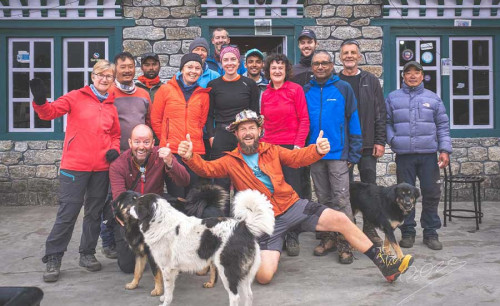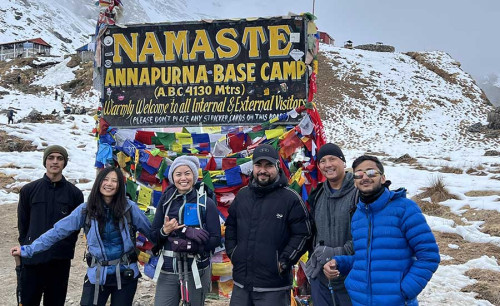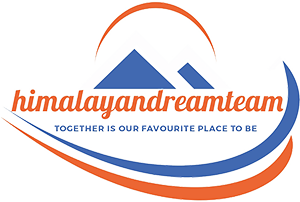Essential Nepali Words for Your Trekking Adventure in Nepal
Published On : 28th May, 2024 By Himalayan Dream Team

Trekking in Nepal is an adventure of a lifetime, offering stunning vistas of the Himalayas, rich cultural experiences, and encounters with warm, hospitable people. To enhance your trekking experience and connect more deeply with the local communities, learning some basic Nepali words and phrases can be incredibly rewarding. Here are ten popular Nepali words every tourist should know that will be useful on your trekking adventure.
1. Namaste (नमस्ते)
The quintessential Nepali greeting, "Namaste," is a word you'll hear frequently. It means "hello" and "goodbye" and is accompanied by a slight bow with hands pressed together in a prayer-like gesture. This respectful and warm greeting is a great way to start any interaction with the locals. Whether you're trekking, on a cultural tour, or cycling through the villages, "Namaste" will help you connect instantly.
2. Dhanyabad (धन्यवाद)
Expressing gratitude is a universal gesture of goodwill. "Dhanyabad" means "thank you" in Nepali. Whether you're thanking your guide, a teahouse owner, or a fellow trekker, this word will help you show your appreciation for the kindness and assistance you receive along your journey. It's especially useful when you encounter the extraordinary hospitality Nepal is known for.
3. Hajur (हाँजुर)
"Hajur" is a versatile word that means "yes" or "excuse me" and is used to show respect, especially towards elders or those in authority. It's a polite way to affirm or acknowledge someone, making it an essential word to have in your vocabulary while trekking. This word is particularly handy when navigating tours or interacting with local guides and elders.
4. Paani (पानी)
Staying hydrated is crucial during your trek, and knowing the word "paani" (water) will help you ensure you always have enough to drink. You can use it when asking for water in teahouses or while filling up your bottle from a stream or tap. Cyclists will also find this word useful when replenishing their supplies in remote villages.
5. Bistarai (बिस्तारै)
Trekking in the Himalayas is challenging, and the terrain can be steep and rugged. "Bistarai" means "slowly" and is a useful word to remind yourself and others to take it easy and pace yourself. It's also handy when navigating narrow paths or passing fellow trekkers. Cyclists navigating tricky trails will find this word equally important for maintaining safety.
6. Tsoh (छ)
"Tsoh" is a simple yet important word that means "okay" or "yes." It’s a quick way to affirm or agree with someone, whether you're responding to a guide’s instructions or agreeing with a local about the beauty of the landscape. This affirmation can be particularly useful during group tours or when coordinating with your cycling team.
7. Mitho (मिठो)
Food is an integral part of any trekking adventure, and you'll want to compliment the delicious meals you encounter. "Mitho" means "delicious" or "tasty." Using this word will surely bring a smile to the face of those who prepare your meals, showing your appreciation for their culinary skills. It’s a great word to use whether you’re enjoying a meal at a mountain lodge or a local eatery during your cycling tour.
8. Shanti (शान्ति)
"Shanti" means "peace" and reflects a core value of Nepali culture. You'll often hear this word in religious contexts or during moments of tranquility in the mountains. It’s a beautiful word to know, especially when soaking in the serene and peaceful environments of the Himalayas. Whether you’re on a spiritual tour or a meditative cycling journey, "shanti" embodies the essence of Nepali tranquility.
9. Dai/Didi (दाइ/दिदी)
Addressing people respectfully is important in Nepali culture. "Dai" means "older brother," and "Didi" means "older sister." These terms are used not just for family but as respectful ways to address anyone older than you. Using these words will help you build rapport with the locals. This respectful address is particularly beneficial when seeking assistance or guidance on your trekking or cycling routes.
10. Ramro (राम्रो)
"Ramro" means "good" or "beautiful" and is a versatile word to describe the stunning scenery, the quality of food, or any positive experience you have. Whether you're admiring a breathtaking view or enjoying a pleasant conversation, "ramro" is a word you'll find many opportunities to use. This word will be your go-to for complimenting the myriad experiences you’ll encounter on your Nepal adventures.
Final Thoughts
Learning these basic Nepali words will greatly enhance your trekking, tours, and cycling experience in Nepal. Not only will it help you navigate your journey more smoothly, but it will also allow you to connect more meaningfully with the local people. The effort you put into learning these words will be appreciated and will make your adventure even more memorable. Happy trekking, touring, and cycling.
Recent Posts

10th Nov, 2025

9th Nov, 2025

25th Oct, 2025

22nd Oct, 2025

17th Oct, 2025

17th Oct, 2025

13th Oct, 2025

12th Oct, 2025

9th Oct, 2025

5th Oct, 2025

3rd Oct, 2025

1st Oct, 2025

29th Sep, 2025


